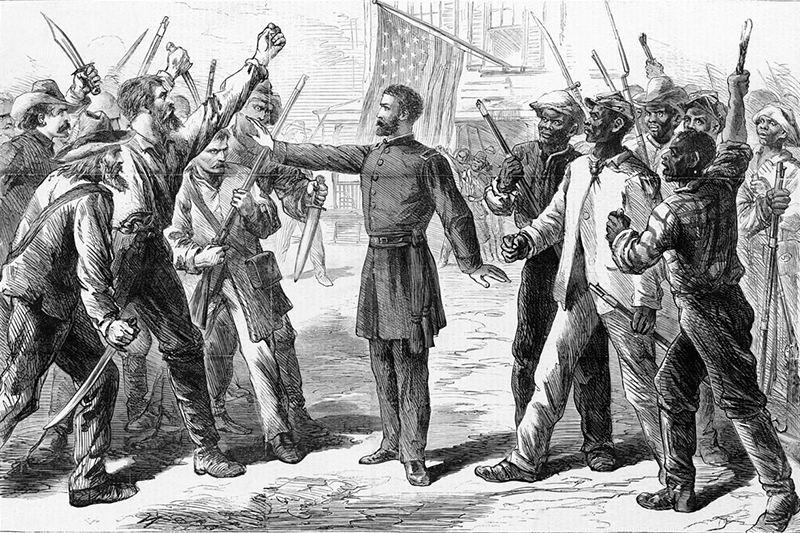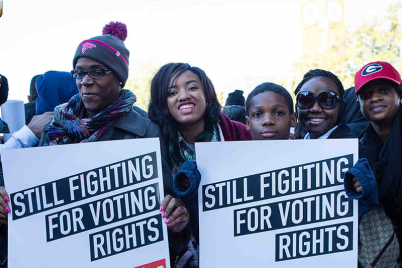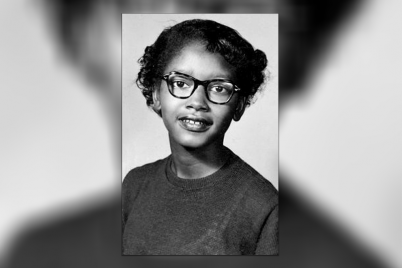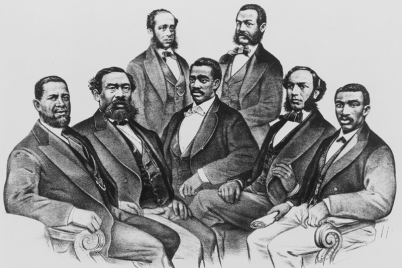The Freedmen’s Bureau was created to give legal title for Field Order 15—better known as “40 acres and a mule.” In this 1868 illustration from “Harper’s Weekly,” a Bureau agent stands between armed groups of whites and freedmen.
JENNIFER GAMBLE-THEARD, M. ED., Historian
Reparations for slavery has been a topic of debate for decades, especially outside of mainstream political thought. Most recently, the issue of compensating the descendants of African slaves in America seems to be a particular point of interest as presidential candidates for the 2020 election voice their opinions about some form of social redress for the atrocities of slavery.
Also, new proposals from reparations advocacy groups suggest that perhaps there should be some type of financial compensation for decades of legalized segregation and discrimination against African Americans in employment, housing, health and education.
The idea of giving African Americans reparations for slavery started right after the end of the Civil War in 1865. It began with a promise of agrarian reform for agricultural farmland of “40 acres and a mule” to aid formally enslaved black farmers. But the government of that time never took the idea of reparations for blacks as a serious or pertinent political consideration after President Abraham Lincoln was assassinated.
During the 1980s, the case for reparations became more noticeable again when former Democratic Representative John Conyers introduced a bill to create a commission to study reparations as a matter of real consideration. The idea was presented as a bill, and it has been repeatedly re-introduced in Congress, but it has never passed.
Although a reparations bill has not passed through Congress, yet, fascinating financial information emerged from studies that analyzed how to put a cash value on hundreds of years of forced servitude by those who were stolen from Africa, and their descendants.
The most often-quoted figure by anthropologists Jason Hickel noted that “It is estimated that the United States alone benefited from a total of 222,505,049 hours of forced labor between 1619 and the abolition of slavery in 1865. Valued at the US minimum wage, with a modest rate of interest, that is worth $97 trillion today.”
Since the early 80s, activist groups have been formed that advocate to keep the idea of reparations to African Americans alive. Groups such as the National Coalition of Blacks for Reparations in America and the Restitution Study Group have organized during the past few years and have gained momentum to push the idea of reparations forward.
As well, studies and formulations by concerned activists groups have been conducted, books and magazine articles have been written, conversations and debates have been made, lawsuits have been initiated pertaining to the details related to what America owes to blacks.
One can understand the insistence of reparations when he or she knows the history of how corporations, families and individuals benefited from stealing labor, forced breeding, torture and from committing numerous horrendous acts. Some wealthy people today are the beneficiaries of unjust enrichment and illicit profits from generations of the past.
Even when it is evident that there are those who stand high today on the shoulders of slavery’s past, they seem to feel that slavery was such a long time ago and since they didn’t have anything to do with it they feel no responsibility for making amends of anything related to slavery.
To others, they feel that America made up for slavery many years ago with the Civil War, and in recent times with welfare benefits, and that reparations of any kind are not necessary.
Conservative thinkers have as well suggested that the idea of reparations is an insult to African Americans disguised as social justice. For instance, a former candidate for mayor of St Petersburg, Paul Congemi, told reparations activists who were trying to make reparations a political issue in St. Pete that their “reparations were Barack Obama and to go back to Africa…”
Recently, new reparations advocacy groups, Black Lives Matter and even a United Nations panel said that the U.S. should pay slavery reparations. Last year the panel declared that the United States owed African Americans reparations for the country’s history of “enslavement, racial subordination and segregation, racial terrorism and racial inequality and the legacy of a racist past.”
As major candidates for the office of president of the United States have recently begun to address the issue of reparations, perhaps the idea may develop more strength and traction to be considered as a future possibility of an outcome that can improve the economic lives of African Americans.
Jennifer Gamble-Theard, M.Ed. is a retired Pinellas County educator in the study of history and language. She is also the historian for the St. Petersburg Branch of ASALH.








